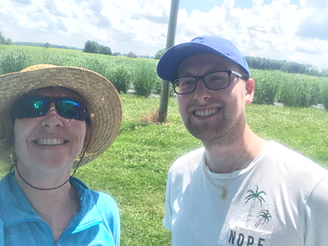With the world abuzz about COVID-19 and climate change, viruses are at the forefront of many people’s minds. Over 4,000 viruses have been described to date (1,000 of which infect plants), and many more await detection. Identifying viruses in humans is important to the field of medicine, just as detecting them in plants is important to the stability and health of natural areas and food systems. The ability to quickly detect viruses by determining the makeup of DNA molecules, known as High Throughput Sequencing (HTS), is a recent development in virus research. This method has many potential applications including how climate change and multiple infection impact wild and domesticated plant communities. This integration of virology and ecology is the future of studying plant viruses.

In order to create a comprehensive review of plant-associated virus detection, François Maclot led an international network of virologists and plant biologists on an exploration of current methods and their future applications for detecting viruses in plants. The Malmstrom lab was excited to assist with this project by providing an ecological perspective and hosting François during the summer of 2019.

fieldwork at Kellogg Biological Station.
Photo credit C. Malmstrom
François is in the final stages of his PhD in Bio-Engineering at Gembloux Agro-Bio Tech in Belgium under the mentorship of Sébastien Massart, who also contributed greatly to this manuscript. Handling the biological data, a discipline known as bioinformatics, is one of the most fundamental parts of HTS. Addressing the diversity of problems that can arise when handling such data included feedback and ideas from many colleagues. Thierry Candresse leads research on plant viruses at French National Institute for Agriculture, Food, and Environment in Paris, France. Denis Filloux and Philippe Roumagnac research bioinformatics and virus ecology at CIRAD in Montpellier, France. René van der Vlugt is a senior plant virologist in the Laboratory of Virology at Wageningen University in the Netherlands.
Written by Ally Brown
To learn more: https://www.frontiersin.org/articles/10.3389/fmicb.2020.578064/full
Maclot F, Candresse T, Filloux D, Malmstrom CM, Roumagnac P, van der Vlugt R and Massart S (2020). Illuminating an ecological blackbox: Using high throughput sequencing to characterize the plant virome across scales. Front. Microbiol. 11:578064. doi: 10.3389/fmicb.2020.578064